|
|
|
Sort Order |
|
|
|
Items / Page
|
|
|
|
|
|
|
| Srl | Item |
| 1 |
ID:
076459
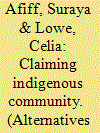

|
|
|
| 2 |
ID:
076457


|
|
|
| 3 |
ID:
132501
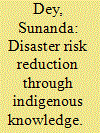

|
|
|
|
|
| Summary/Abstract |
Disasters occur at the interface of society, technology and environment and are fundamentally the outcomes' of the interaction. of these features. In very graphic ways, disasters signal the failure of a society to adapt successfully to certain features of its natural and socially constructed environment in a sustainable fashion (Smith and Hoffman, 2002).
|
|
|
|
|
|
|
|
|
|
|
|
|
|
|
|
| 4 |
ID:
132502
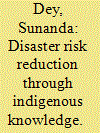

|
|
|
|
|
| Summary/Abstract |
Disasters occur at the interface of society, technology and environment and are fundamentally the outcomes' of the interaction. of these features. In very graphic ways, disasters signal the failure of a society to adapt successfully to certain features of its natural and socially constructed environment in a sustainable fashion (Smith and Hoffman, 2002).
|
|
|
|
|
|
|
|
|
|
|
|
|
|
|
|
| 5 |
ID:
132503
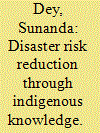

|
|
|
|
|
| Publication |
2014.
|
| Summary/Abstract |
Disasters occur at the interface of society, technology and environment and are fundamentally the outcomes' of the interaction. of these features. In very graphic ways, disasters signal the failure of a society to adapt successfully to certain features of its natural and socially constructed environment in a sustainable fashion (Smith and Hoffman, 2002).
|
|
|
|
|
|
|
|
|
|
|
|
|
|
|
|
| 6 |
ID:
189949


|
|
|
|
|
| Summary/Abstract |
Human beings come from various backgrounds shaped by their norms, culture, belief systems, age, social orientation and their language. In addition to all these human beings, the common denominator is that they are different in terms of their parity and equality. This difference of human beings in the world has their own knowledge and cultural practices towards contribution of knowledge. Transformation of leadership which is imperative during the decolonialisation projects demands among other things more information about African traditional leadership. The realisation and existence of such leadership cannot be imagined without the indigenous knowledge which was and is still rich with ingredients of growing and leading African people to the right direction. Our South African context demands that women must also be uplifted to leadership roles in society and the workplace, but this usually collides with different African beliefs that still put women secondary to men, for instance, the issue of taboos which mainly promote the subjection of women. For the sake of this research, the focus is on those taboos which portray women as inferior to men in the society. Two cultures were selected for this purpose, Xitsonga and IsiZulu.
|
|
|
|
|
|
|
|
|
|
|
|
|
|
|
|
| 7 |
ID:
181947


|
|
|
|
|
| Summary/Abstract |
The development of land rights programs is deeply rooted in power relations. Using discourse analysis, this paper unpacks how Western logics (assumptions and conventions) regarding ‘best practices’ for property rights institutions and tenure security impact the design of peacebuilding programs. In 2017, the Government of Timor-Leste passed a controversial Land Law Package. These laws were initially developed for a USAID land reform program. But local dynamics, actions, and interests were ignored. Examining civil society exclusion from decision-making infers a reluctance to acknowledge local voices and practices that threaten liberal peacebuilding interests. This paper is organised into two parts. In the first, we argue that peacebuilding ‘best practices’ reflect how dominant Western discourses create conceptual boundaries (‘violent hierarchies’) to restrict the recognition of indigenous ideas as legitimate. In the second, we examine Timorese civil society efforts to improve the land reform program through acts of resistance to bodies of authority. Overall, we illuminate how in Timor-Leste Western assumptions and conventions contributed to boundaries to local participation, which contradicts liberal narratives of empowerment and capacity-building.
|
|
|
|
|
|
|
|
|
|
|
|
|
|
|
|
| 8 |
ID:
129196


|
|
|
|
|
| Publication |
2014.
|
| Summary/Abstract |
Indigenous peoples have been marred for centuries by the incredulous theft of knowledge they obtained, and even resources they use. The thieves are superior, more developed powers that jealously protect the rights to knowledge that is not rightfully theirs. They then refuse to recognize that the true ownership of such precious information belongs to Native Peoples. Indigenous knowledge is stolen without the slightest consideration to the powerful implications that it comes equipped with. The moral repercussions behind such an unethical system leads to loss of Native culture and sustainability and a shift from using Native knowledge and resources for social needs to profit generation. These problems are exacerbated by the use of Intellectual Property Rights (IPR), and the situation has delved to the point where nations bypass indigenous consent and wrongfully patent their knowledge and resources.
Why Indigenous Knowledge Is So Important
Knowledge of the natural world is not limited to science. Peoples spanning across the world have developed, over many years, a set of culturally rich knowledge systems that have been a result of the environments that they live in. Indigenous knowledge revolves around the environment and is of a largely ecological type. It is also referred to, by the World Bank, as the "traditional knowledge of the uses of plants" and even "ethnobotany."
|
|
|
|
|
|
|
|
|
|
|
|
|
|
|
|
| 9 |
ID:
076461
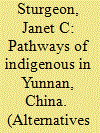

|
|
|
| 10 |
ID:
099615
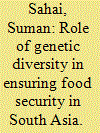

|
|
|
|
|
| Publication |
2010.
|
| Summary/Abstract |
Genetic diversity in the field is the key to long-term sustainable food production. In agriculture and forestry, genetic diversity can enhance production in all agricultural and ecosystem zones. Genetic erosion is the loss of genetic diversity, which is being caused not just at the level of individual genes but at the level of gene combination, which is even more dangerous. The main cause of genetic erosion is varietal replacement. However, there are many traditional varieties that are extremely high yielding and that can, in fact, form a much bigger mix of varieties available in the field than this very narrow approach to increasing productivity would suggest. Genetic erosion is happening at a more rapid pace in developing countries because of the somewhat faulty planning to bring about change and increase productivity. Above all, agrobiodiversity, which is genetic diversity related to agriculture, is threatened not because of overuse but because it is not used
|
|
|
|
|
|
|
|
|
|
|
|
|
|
|
|
| 11 |
ID:
173984


|
|
|
|
|
| Summary/Abstract |
Climate change and variability have direct negative impacts on rural smallholder farmers. These impacts involve extreme climatic events such as excessive temperatures, prolonged droughts and floods which affect people’s livelihoods. This study was conducted in Nkomazi Local Municipality, Mpumalanga, South Africa. The main objective of the study was to investigate indigenous weather and climate indicators used by smallholder farmers and the role of indigenous knowledge in their farming systems. The research used qualitative methods, including focus group discussions and key informant interviews. The findings indicated that farmers observed animal behaviour, plants, atmospheric indicators and human ailments to predict weather.
|
|
|
|
|
|
|
|
|
|
|
|
|
|
|
|
| 12 |
ID:
187282
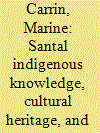

|
|
|
|
|
| Summary/Abstract |
Using different archives, I show how indigeneity was constructed by the Santal themselves during the second half of the nineteenth century, through various figures such as rebels and prophets. This has produced a Santal indigenous knowledge at the interface of orality and writing, revolving around two dimensions—an emergent historical consciousness and a feeling of shared identity, which still informs Adivasi resistance today, enabling them to voice assertion over natural resources. The sacralization of the landscape through pilgrimages and ritual commemorations entails the liberation of formerly encompassed identities, allowing the subaltern communities a certain visibility in the public sphere. Providing a new imagining against dispossession and memory loss, indigenous knowledge, which combines multi-scripturality and ritual innovations, becomes a resource for politics of representation as well as of a common Santal identity.
|
|
|
|
|
|
|
|
|
|
|
|
|
|
|
|
|
|
|
|
|